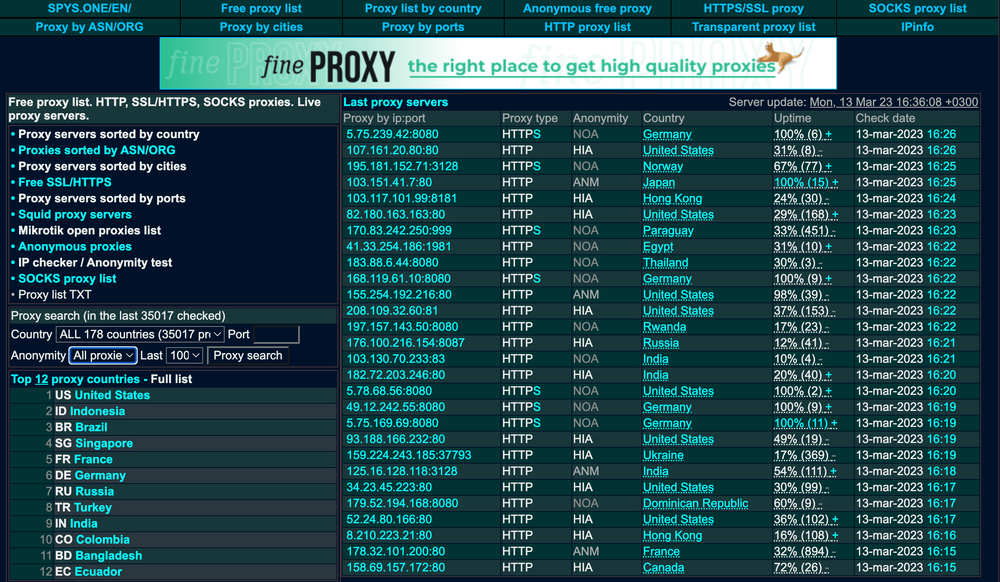Picking the Appropriate Proxy Service Server: Everything You Must to Know

In online landscape, in which internet privacy and safety are more important than ever, understanding the role of proxy servers has turned into vital for not only individuals and companies similarly. A proxy acts as an intermediary connecting your system and the web, providing a level of protection and anonymity. This piece will guide you in navigating the crucial aspects of choosing the right proxy to fulfill your requirements, regardless of whether you're looking to enhance your internet safety, bypass geographical blocks, or optimize your digital workflows.
With countless options available, navigating the world of proxies can feel overwhelming. From the variations between various categories such as HTTP, Socket Secure, and transparent servers, to understanding how they can enhance your online security and efficiency, we will explore what you need to take into account when selecting the best server for your specific circumstances. If you are a gamer aiming to reduce lag or a business seeking improved cybersecurity measures, this thorough manual has gotten you supported.
Grasping Proxy along with Its Functionality
A proxy server acts as an go-between between a user's system and the internet, aiding requests and replies. When a user looks to access a site, the request first is sent to the intermediary instead of immediately reaching the website. The proxy then forwards the request to the desired destination, retrieves the data, and returns it to to the user's gadget. This method helps conceal the user's internet protocol address, making it harder to follow their web actions.
The functionality of proxies extends beyond mere anonymity. They can archive content, which allows for speedier reach to frequently visited websites, in the end enhancing speed. Additionally, proxies provide the capability to filter content, restricting access to specific websites based on established guidelines. This capability is particularly useful for companies seeking to restrict access to non-business data, thereby promoting productivity within the office.
In regards to safety, these servers can aid reduce risks associated with web actions. By functioning as a filter, they can stop direct access to confidential information and serve as a shield against potential risks such as malicious attacks. Some proxy servers also support encryption protocols, offering an additional layer of protection for user information as it travels across the web. Overall, understanding how these servers work is essential for taking advantage of their features in multiple online activities.
Advantages and Risks of Utilizing Proxy Servers
Using proxy servers presents several benefits that boost online privacy and security. By functioning as intermediaries between users and the internet, proxy servers help to hide the original IP address, which can safeguard users from unwelcome tracking and profiling by advertisers and malicious entities. This anonymity enhances user privacy and can lower the risk of targeted cyberattacks. Additionally, proxies can also provide access to geo-restricted content, enabling users to bypass censorship and enjoy services or websites that might otherwise not be unavailable in their region.
However, there are risks associated with the utilization of proxy servers, particularly when choosing for free or unreliable services. Free proxies can expose users to potential data breaches, where sensitive information may be recorded or sold to third parties. Furthermore, many such proxies lack proper security measures, rendering them vulnerable to hackers. Users may also face reduced internet speeds and connection instability, especially if the proxy server is congested or poorly maintained. It is crucial to carefully evaluate the quality and reliability of a proxy service before investing to its use.
Another significant factor is the legal and ethical implications of using proxy servers for certain activities. While they can provide significant advantages for tasks like data mining or accessing restricted content, improper use may lead to breaches of terms of service and potential legal repercussions. Users should be mindful of the ethical considerations involved in using proxies, ensuring that they are compliant with all applicable laws and guidelines while leveraging the capabilities these servers offer. Balancing the benefits with awareness of potential downsides is crucial for making educated decisions about proxy usage.
Picking the Right Proxy Server for Your Specific Requirements
As you choosing a proxy, it is essential to consider specific needs. Learn more here call for specific types of proxies. For example, if you need to reach region-locked content, a home proxy could be a most suitable choice as it looks like a regular user's connection. On the flip hand, if you are focused on data scraping or market research, data center-based proxies are typically quicker and more capable, though not quite anonymous. Clarify the main goal of your proxy utilization to help make an informed choice.

A further important aspect is the degree of anonymity and security you require. When online privacy is a major concern, look for proxies that feature solid encryption and further security options. Certain proxies include anonymity degrees that protect your real IP address is kept hidden, while others can compromise on security for performance. Considering the trade-off between these considerations based on your needs can assist you choose the correct proxy solution.
Lastly, consider budget and dependability. While free proxies may be tempting, they often come with issues, such as information breaches and inconsistent performance. Investing in a reputable paid proxy provider generally delivers better security, faster speeds, and personal support. Research various companies, read customer feedback, and take benefit of free offers to determine a proxy solution that offers the most advantage for your needs.
